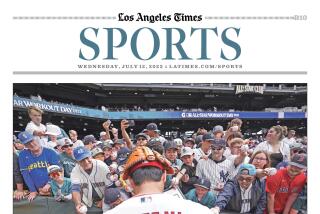Open Scoring Would Add to Problems
- Share via
Bob Arum has an idea he thinks will improve boxing: open scoring by the judges.
Oscar De La Hoya thinks it’s a good idea as well.
And they are both wrong.
While the time-honored tradition of keeping the judges’ round-by-round scores secret until the end of a fight can breed suspicion, the alternative could ruin the sport.
Arum and De La Hoya, reacting to the outrageous draw in the recent Evander Holyfield-Lennox Lewis heavyweight title fight, are asking the Nevada State Athletic Commission to institute a system in which the scores are revealed after each round. They would like it in place in time for De La Hoya’s defense of his World Boxing Council welterweight title on May 22 against Oba Carr in Las Vegas.
If the judging of Eugenia Williams, whose scorecard favored Holyfield in a fight Lewis won in the eyes of most knowledgeable boxing observers, was caused by either incompetence or worse, open scoring wouldn’t have changed anything.
And that, in most cases, is a good thing.
Do Arum or De La Hoya really want a judge who will be influenced by the booing of the crowd or the raised eyebrows of other officials who don’t agree with the way that judge is seeing a fight?
The pressure of those around them is not the way to influence judges. The only solution is competent judges who don’t need to be pressured to do the right thing.
On the other hand, revealing the ongoing score can create unneeded pressure on the fighters involved.
Let’s say a fighter wins six of the first seven rounds of a 12-round fight. He and his handlers look at the scorecard and realize that he can’t lose unless he is knocked out.
So what does he do?
If he is smart, he runs for the next five rounds and picks up his victory.
And his opponent, knowing he can’t win without a knockout, chases him around the ring, flailing wildly in a desperate attempt for the knockout.
Is this going to make for a better match?
Hardly.
“[Arum] has every right to ask for that,” Marc Ratner, executive director of the Nevada commission, said of the open-scoring proposal. “Personally, I would never be in favor of it for a lot of reasons.
“Let’s say one fighter receives an accidental head butt after having already won enough rounds to get the decision. An unscrupulous trainer might deliberately not fix the cut in order to make it worse so the fight will be stopped.
“Open scoring could change philosophy. It might affect the referee. If a guy goes down and the referee sees that he has already lost, say six of eight rounds, the referee may think he’d better stop the fight. It could affect the doctor who has to decide if a fight should go on.
“A myriad of things could be opened up by open scoring.”
Not the least of which, Ratner agreed, is the strategy of the two fighters.
“This way, a fighter can never say he has a fight won until the end,” Ratner said. “That is part of the allure.”
GO LONG
Here’s a another idea. How about going back to 15-round fights?
While that wouldn’t improve the judging, it would give the fighters a better chance of deciding their fate.
And provide fans with more memorable moments.
Think of the first Muhammad Ali-Joe Frazier fight, in 1971, and what comes to mind? Frazier’s perfect 15th-round left hook that sent Ali crashing to the canvas in the defining instant of the fight.
Think of Ali-Frazier III in 1975, better known as the Thrilla in Manila, and what comes mind? Frazier, his eyes swollen shut, forced to quit after the 14th round while, in the other corner, Ali later said he felt near death.
The 13th, 14th and 15th rounds of fights are a true test of character and courage, of the ability of a fighter, worn down by fatigue and punishment, to prevail.
With three more rounds of Holyfield-Lewis, there might not have been a need for the judges.
Fights were cut to 12 rounds a decade ago because it was considered safer for the participants. But there is no medical evidence that the additional three rounds make a difference in the fighters’ well-being.
And it could make a difference in the fights.
QUICK JABS
Don’t make plans to see that Holyfield-Lewis rematch just yet. According to Dino Duva, Lewis’ promoter, nothing has been decided except an agreement between Holyfield and his promoter, Don King, and an agreement by both fighters that they will receive equal purses.
All that leaves is a few details, such as a date, site, pay-per-view outlet and contract.
More to Read
Go beyond the scoreboard
Get the latest on L.A.'s teams in the daily Sports Report newsletter.
You may occasionally receive promotional content from the Los Angeles Times.










